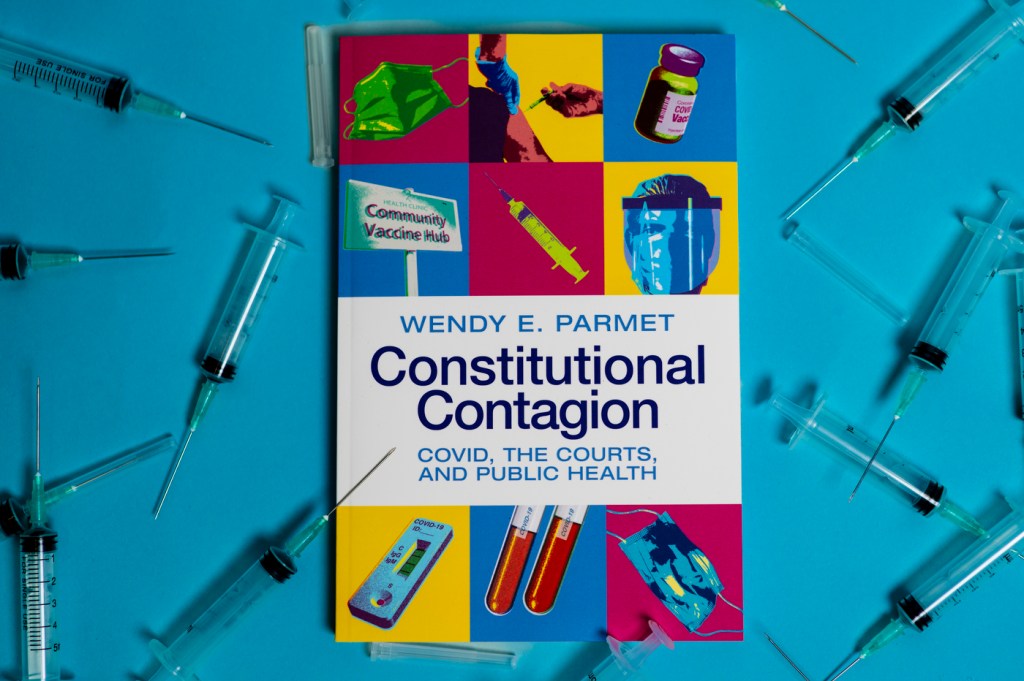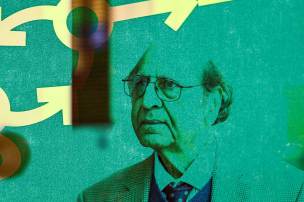Published on
This professor says constitutional law is hurting Americans’ health
Wendy Parmet’s new book, “Constitutional Contagion,” argues that constitutional law has endangered our health—more specifically, that Supreme Court rulings during the pandemic have eroded government’s ability to protect and improve people’s health.

Wendy Parmet’s email inbox started buzzing in February 2020. As the then-mysterious new coronavirus spread across the world, Parmet’s career in public health law made the longtime Northeastern University law professor a sought-after interviewee.
“I was suddenly in this whirlwind,” Parmet recalls. “Most of the time I go through my life, and nobody knows who I am, except my dog and my family.” But as COVID-19 shut down most of society, the New Yorker, the Atlantic and the New York Times all quoted Parmet. She wrote opinion pieces for the New England Journal of Medicine, the Washington Post and Scientific American.
“I was grateful for the opportunity to talk,” says Parmet, now one of Northeastern’s most-quoted experts of the 2020s, “and I felt like what I was saying was important. On the other hand, sometimes it felt like almost too much.”
Though COVID-19 was alarming, the courts’ response didn’t alarm Parmet—not at first. Several months into 2020, Parmet wrote a law review article about early COVID-19 litigation. “I concluded that courts were doing about as well as you could expect,” she says.
A U.S. Supreme Court injunction issued Thanksgiving Eve 2020 changed that. The court struck down New York state’s limitations on the number of people who could gather for religious services during the pandemic, citing freedom of religion. Parmet found the decision alarming. “The way the court analyzed that case,” she argues, “they were now signaling that the game had changed and that, in a way, public health was no longer important to the court.”
Several similar Supreme Court decisions followed. Some also struck down pandemic-era regulations on religious worship. Others found that the Biden Administration had exceeded its authority to issue regulations. Parmet felt that the decisions gave short shrift to a key 1905 decision, Jacobson v. Massachusetts, which upheld a smallpox vaccine requirement. “Something was changing in the way the courts understood public health, and in the way our country was responding to a health crisis,” she says, “and I felt like I needed to tell that story.”
That led Parmet to write her new book, “Constitutional Contagion,” released in May by Cambridge University Press. The book argues that constitutional law has endangered our health—more specifically, that Supreme Court rulings during the pandemic have eroded government’s ability to protect and improve people’s health.
Constitutional Contagion is Parmet’s third book (fifth if you count books she’s co-edited). It’s one she didn’t expect to write.

“When I wrote my last book,” she says, “after it came out, I vowed to friends and family that I would never write another book. It’s not always a happy experience, and it’s hard.”
There’s also a personal reason. “There was a lot of emotional baggage about books in my family DNA.” Her father, Herbert Parmet, was the author of 11 books on American history, including presidential biographies. “He was very invested in his books,” Parmet recalls. “The releases were always tense in the family. You wanted Dad to do well.”
Parmet grew up in New York City and graduated from Bayside High School in Queens, where she was a curious student, excited about science and U.S. history, math and English. She headed off to Williams College, intending to study pre-med. But she found the lack of women in an organic chemistry class alarming. After getting a lot of advice that the humanities were better for women, she says with a hint of melancholy at a road not taken, she switched to studying government.
But Parmet quickly found a way to combine her interests in government and health. After a transfer to Cornell University, she wrote her undergraduate thesis on the 1970 legalization of abortion in New York state. “If infectious disease was the larger thread of my career, reproductive justice was the second,” she says. She’s taught at Northeastern’s law school since 1985.
In 1998, before the U.S. Supreme Court, Parmet was co-counsel in Bragdon v. Abbott, part of a team that convinced the court to rule that the Americans with Disabilities Act protects HIV patients. Her fellow attorney on the case, she says, “still has my handwritten notes that I was passing him during the oral argument.” A Northeastern connection got her on the case: Dan Jackson, then a law student of Parmet’s, worked at a co-op at GLAAD, an advocacy group for LGBTQ rights. Assigned to the Abbott case, Jackson (now director of Northeastern’s law lab) “told his supervisor that he had a professor who was an expert on these issues,” Parmet recalls.
Parmet’s interest in health law led her to immigration law. She was lead counsel on a 2012 case in which Massachusetts’ Supreme Judicial Court ruled that denying legal immigrants access to the state’s subsidized health insurance marketplace violated the state constitution. That led her to co-write the book “The Health of Newcomers” with Patricia Illingworth, a Northeastern philosophy and business professor. The book argues that providing health care to immigrants benefits everyone’s health.
All of Parmet’s work on infectious disease and immigration came together in the pandemic. She wrote about COVID-19 and health law in academic journals and mass-media op-eds, while answering questions about rapidly evolving pandemic regulations in the national press. Since then, she’s seen more surges of interview requests: in 2022, when the Supreme Court’s Dobbs decision allowed states to ban abortion, and in spring 2023, when judges in the Southwest U.S. attempted to restrict the abortion pill mifepristone.
Now, Parmet is returning to the law of pandemics. “Constitutional Contagion” argues that courts, including the U.S. Supreme Court, have made decisions that will make it harder for the U.S. to respond to future health emergencies. Many judges have focused so much on individual rights during the pandemic, argues Parmet, that they forsook a longtime precedent that liberty includes freedom from disease.
“The law does not allow me to make you sick,” Parmet says. “The law has always recognized that we have obligations to one another to refrain from injuring one another. The law values our health.”
In the new book, Parmet doesn’t endorse any specific COVID-19 policies. At times, she acknowledges that some social-distancing rules, such as prolonged school closings, have caused lasting harm, and that courts have a role to play in stopping unreasonable restrictions on liberty. She also criticizes Dr. Anthony Fauci for his early March 2020 statement that people didn’t have to wear masks in public—an opinion that the former director of the National Institute of Allergy and Infectious Diseases reversed later in the pandemic.
But Parmet’s main argument is that conservative judges and justices have dangerously eroded government’s power to create science-based regulations during epidemics. “We cannot enjoy our liberty,” she says, “if we lack, as a people, the capacity to provide reasonable and scientifically founded policies to promote our mutual health.”
In later chapters, “Constitutional Contagion” goes beyond COVID-19 to talk about Americans’ poor health. Over 50 other countries now have higher life expectancies than the U.S., she notes.
“People in the United States live shorter lives and less healthy lives than the people in much of the world,” she says. “I don’t think most people in the U.S. know that.” A lot of factors contribute to that, she says, including racial and other inequities. But she argues that the law also plays a role.
For example, Parmet criticizes the U.S. Supreme Court’s 2012 decision that the federal government couldn’t force states to expand Medicaid as part of the Affordable Care Act. (Ten states have refused to join the expansion; others held out several years before joining.) She also points to the Supreme Court’s gun-rights rulings. “The number-one cause of childhood deaths in the United States right now is guns, and the courts have made it almost impossible to regulate to lower those harms,” she says. (Firearms surpassed car accidents as the top cause of death for Americans age 1 to 18 in 2020 and 2021, according to a Centers for Disease Control and Prevention database.)
From the Supreme Court’s COVID-19 cases to the lower-court rulings that attempted to restrict the abortion pill, “You see a disregard of medical evidence or expertise,” she says. “You see a lack of deference to administrative agencies and health officials.” The Supreme Court and some other federal courts, she says, have “forgotten the limits of their own knowledge.”
“Constitutional Contagion” ends with a faint note of hope that the courts may change course on health law. “I hope our courts will begin to recognize that the protection of health is part of our social contract,” Parmet says. “It’s among the reasons we have a government.”
Erick Trickey is a former Northeastern Global News Magazine senior writer. Follow him on Twitter @ErickTrickey.





